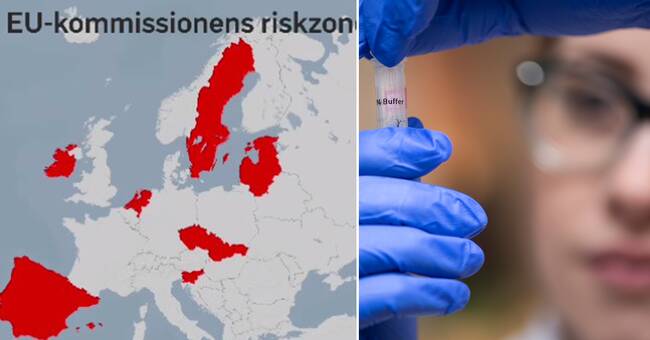EU countries that have had more than 500 new corona cases per 100,000 inhabitants in the last two weeks will henceforth be painted in dark red on the risk maps compiled by the European Infection Control Unit ECDC.
The European Commission hopes that it will provide a better picture of where the spread of infection is particularly serious.
At the moment, almost the entire EU, with the exception of Finland and Greece, is marked in the red color that has so far marked the worst crisis situation.
- This is necessary to protect our citizens and the internal market, says EU Justice Commissioner Didier Reynders at a press conference in Brussels together with Swedish domestic colleague Ylva Johansson.
Dark red in Sweden
If the proposal passes, most of Sweden - whose latest total two-week figure is 669 new cases per 100,000 inhabitants - will be dark red, as will the Netherlands, Portugal, Slovakia, Ireland, Lithuania, Slovenia, Latvia, Estonia, Cyprus and Malta.
The countries can be painted in several different colors at the same time, depending on what it looks like in the different regions.
In order to avoid the spread of infection, it is proposed that Member States introduce mandatory tests and quarantine for all entrants from the dark red areas.
Similar requirements already exist in several EU countries, such as Belgium.
The countries decide
At the same time, exceptions are called for for people in border areas, such as commuting between different countries.
The European Commission also emphasizes that those who impose restrictions between different colored areas should not care about national borders.
Instead, the same rules should apply regardless of whether it is within one's own country or between different EU countries.
In the end, however, it is up to each country to decide for itself what is required or not required of the entrants.
Requires test
The European Commission also wants to tighten the rules for entry into the EU from countries outside the Union.
- Do not come here - unless it is really necessary.
Our first piece of advice is: "do not travel", says Ylva Johansson.
Among other things, the Commission wants Member States to require proof of a negative coronation test no later than 72 hours before departure, as well as a completed entry declaration.
However, citizens of EU countries or people who are permanent residents of the EU should be given the opportunity to take their tests on arrival, the European Commission believes.

